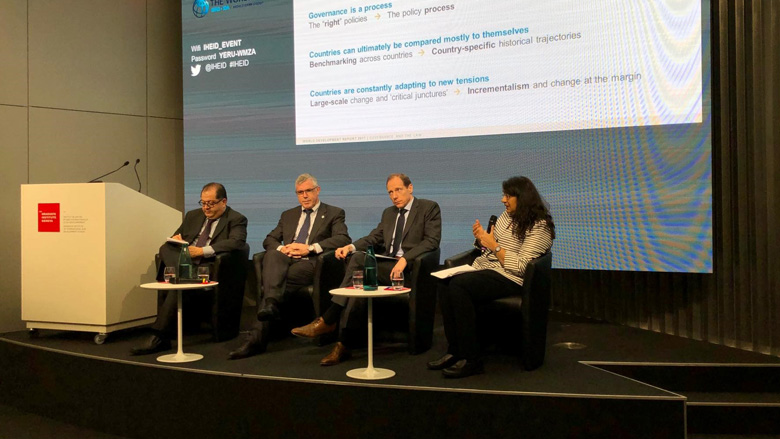On 14 December 2017, the World Bank Group and the Albert Hirschman Centre on Democracy of the Graduate Institute of Geneva invited Mr. Luis F. López-Calva, co-Director of the World Development Report 2017: Governance and the Law, to discuss the main findings of the report. Following the presentation, a panel including Mr. Carsten Fink, Chief Economist at the World Intellectual Property Organization and Dr. Shalini Randeria, Director of the Albert Hirschman Centre on Democracy, provided their comments and highlights of the report. The discussion was moderated by Mr. Jos Verbeek, Manager and Special Representative to the UN and WTO at the World Bank in Geneva.
Presentation of the World Development Report 2017: Governance and the Law
December 14, 2017
Graduate Institute of Geneva, Switzerland

-
“Every society is focused on achieving economic growth, shared prosperity, eliminating violence and providing security to citizens; effective policies should involve these aspects.”
The WDR 2017 analyzes how policy making and policy implementation do not occur in a vacuum. Rather, they take place in complex political and social settings, in which individuals and groups with unequal power interact within changing rules as they pursue conflicting interests.
“Policies should address behavioral, psychological, technological, and institutional aspects to be effective”
The process of these interactions is what this Report calls governance, and the space in which these interactions take place, the policy arena.
“The characteristics of effective agreements are creditably sustained over time (commitment), voluntarily complied to by all parties (cooperation), and collectively shape expectations (coordination).”
Mr. López-Calva highlighted how governance can mitigate, even overcome, power asymmetries to bring about more effective policy interventions that achieve sustainable improvements in security, growth, and equity. Further, he asserted that to achieving effective governance, there must be a clear focus on actors as oppose to only on institutions, highlighting that institutions are a result of the agreements of actors. Mr. López-Calva concluded by reiterating that transitioning to rule of law, though a constant struggle, involves better understanding the historical trajectories of individual countries; the elimination of barriers to enter the policy conversation; and emphasizing function over form.
“If you are reinforcing an equilibrium that has brought about an unsatisfactory outcome, it is very unlikely change will ensue.”
-
-